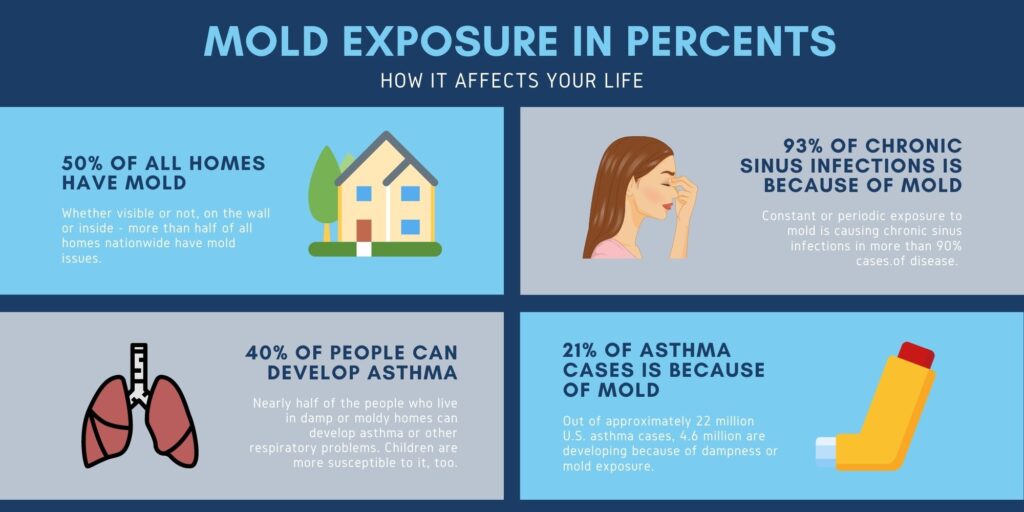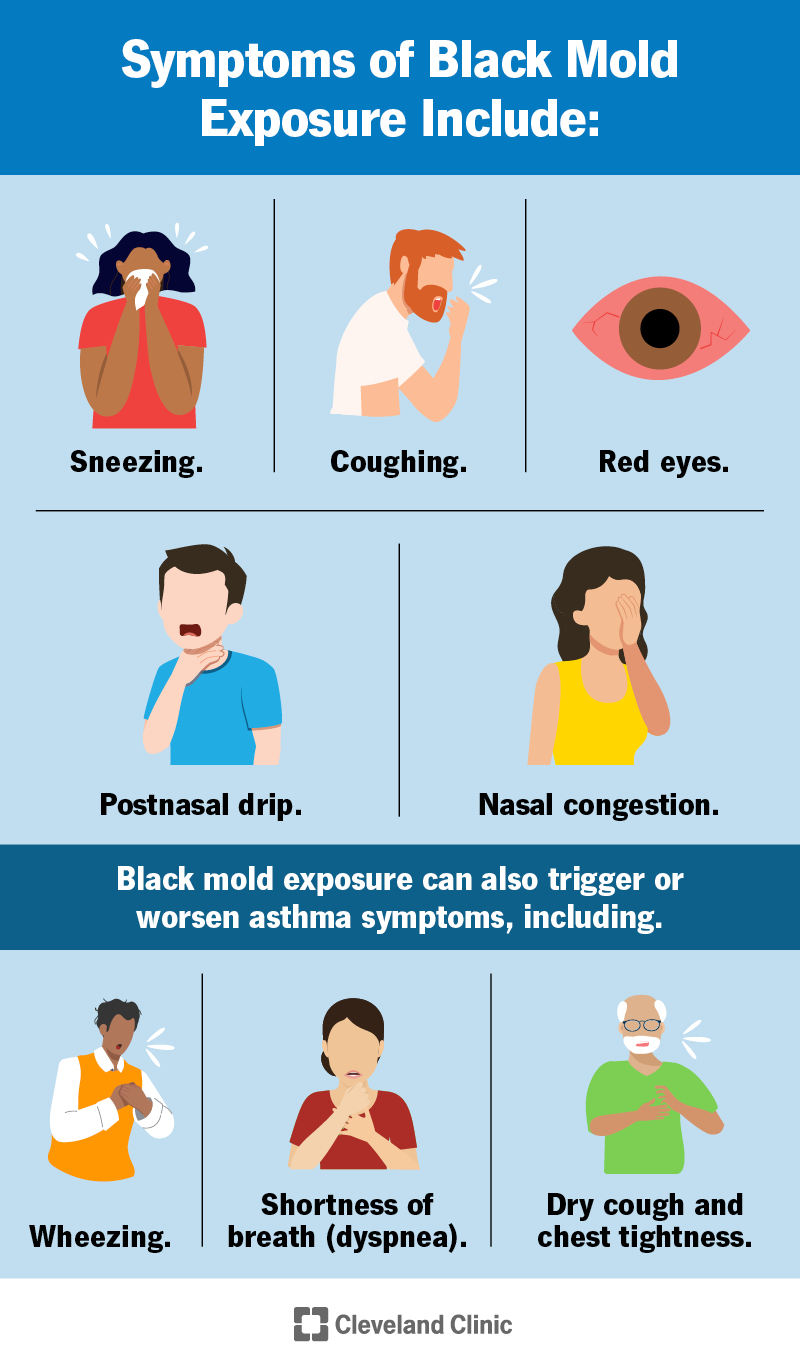Black mold exposure is a serious issue that can have a profound impact on your overall health. With its ability to thrive in damp and humid environments, this toxic fungus often goes unnoticed until it’s too late. In this article, we will delve into the symptoms of chronic black mold exposure and the long-term effects it can have on your well-being.
Throughout the article, we will explore the various signs to watch out for and how they can manifest in your body. From respiratory issues and allergic reactions to more severe conditions like chronic fatigue and neurological problems, black mold can wreak havoc on your health if left untreated. By understanding the symptoms, you can take proactive steps to address the issue and ensure a safe and healthy living environment for yourself and your loved ones. So, let’s dive in and equip you with the knowledge you need to protect your well-being against the long-term effects of chronic black mold exposure.
Symptoms of Chronic Black Mold Exposure
Early Symptoms
If you have been exposed to chronic black mold, you may experience a range of symptoms that can vary from person to person. In the early stages of exposure, you might notice certain signs that something is not right. Common early symptoms of black mold exposure include coughing, sneezing, and a stuffy or runny nose. You may also experience watery and itchy eyes, throat irritation, and frequent headaches. While these symptoms may seem relatively mild at first, they should not be ignored as they may be an indication of more serious health issues to come.
Respiratory Symptoms
As time goes on and your exposure to black mold continues, you may start to develop respiratory symptoms. These can include persistent coughing, wheezing, and shortness of breath. You may also experience chest tightness or discomfort, as well as increased sensitivity to respiratory irritants such as smoke or strong odors. It is important to pay attention to these symptoms, as they can significantly impact your overall respiratory health.
Skin Symptoms
In addition to respiratory symptoms, chronic black mold exposure can also affect your skin. Some individuals may develop rashes, hives, or other allergic reactions upon contact with black mold. These skin symptoms may appear as redness, itching, or even blistering in severe cases. If you notice any unusual changes in your skin, it is essential to seek medical attention to determine if black mold exposure is the cause.
Neurological Symptoms
Black mold exposure can also have significant effects on the neurological system. Common neurological symptoms associated with chronic black mold exposure include difficulty concentrating, memory problems, and confusion. You may also experience frequent mood swings, anxiety, or depression. These neurological symptoms can impact your daily life and overall well-being, making it crucial to address the underlying cause.
Immunological Symptoms
Your immune system can also be impacted by chronic black mold exposure. Prolonged exposure to black mold spores can lead to a weakened immune system, making you more susceptible to infections and illnesses. You may notice an increase in the frequency or severity of colds, flu, or other respiratory infections. In some cases, individuals with compromised immune systems may even develop chronic sinusitis or bronchitis. It is essential to take steps to strengthen your immune system and minimize exposure to black mold to protect your overall health.
Digestive Symptoms
If you are experiencing chronic black mold exposure, you may also notice a range of digestive symptoms. These can include nausea, vomiting, diarrhea, or abdominal pain. These symptoms may mimic those of food poisoning or other gastrointestinal disorders, making it important to consider the possibility of black mold exposure as a potential cause. If you are experiencing persistent digestive issues, it is advisable to consult with a healthcare professional for further evaluation.
Musculoskeletal Symptoms
Chronic black mold exposure can affect your musculoskeletal system, leading to various symptoms. Some individuals may experience joint pain or stiffness, muscle cramps, or general body aches. These symptoms can be similar to those experienced in conditions such as fibromyalgia or rheumatoid arthritis, making it important to consider the possibility of black mold exposure if you are experiencing such issues.
Cardiovascular Symptoms
While less common, chronic black mold exposure can also have an impact on your cardiovascular system. Some individuals may experience irregular heart rhythms, palpitations, or even high blood pressure. These symptoms may indicate a strain on your cardiovascular health, and it is important to seek medical attention if you are experiencing any concerning cardiovascular symptoms.
Reproductive Symptoms
If you are pregnant and exposed to chronic black mold, there may be potential risks to both you and your baby. In some cases, black mold exposure during pregnancy can lead to complications such as preterm birth or low birth weight. It is important to discuss any concerns or symptoms with your healthcare provider to ensure the appropriate measures are taken to protect both your health and the health of your baby.
Other Symptoms
In addition to the symptoms mentioned above, chronic black mold exposure can manifest in various other ways. Some individuals may experience chronic fatigue or weakness, unexplained weight loss or gain, or even frequent urination. It is crucial to pay attention to your body and seek medical advice if you notice any unusual symptoms that persist or worsen over time.
Long-term Effects on Your Health
Respiratory Health
Long-term exposure to black mold can have severe consequences on your respiratory health. It can lead to the development or worsening of conditions such as asthma or chronic obstructive pulmonary disease (COPD). Chronic black mold exposure can also increase the risk of developing respiratory infections and bronchitis. It is crucial to address any respiratory symptoms promptly and take the necessary steps to reduce exposure to black mold to protect your long-term respiratory health.
Neurological Health
The neurological effects of chronic black mold exposure can be significant. Prolonged exposure may lead to cognitive impairments, including difficulties with memory, concentration, and problem-solving. Neurological symptoms can also impact your mood and emotional well-being, often leading to increased stress, anxiety, or depression. It is essential to address these concerns with a healthcare professional to minimize the long-term impact on your neurological health.
Immunological Health
The immune system can suffer considerable damage from chronic black mold exposure. Weakened immunity makes you more vulnerable to infections and illnesses, affecting your overall health and well-being. It is important to support your immune system through a healthy diet, regular exercise, and measures to reduce exposure to black mold to minimize the long-term impact on your immune health.
Digestive Health
Gastrointestinal symptoms associated with chronic black mold exposure can have long-lasting effects on your digestive health. Persistent nausea, vomiting, or diarrhea can lead to dehydration and nutrient deficiencies. It is essential to address these symptoms and consult with a healthcare professional to ensure your digestive health is properly managed.
Musculoskeletal Health
The musculoskeletal system can be adversely affected by chronic black mold exposure. Joint pain, muscle cramps, and body aches can have a significant impact on your mobility and overall quality of life. It is important to seek appropriate medical care and consider therapies such as physical therapy or chiropractic treatment to manage these long-term effects on your musculoskeletal health.
Cardiovascular Health
While cardiovascular symptoms are less common, they should not be overlooked. Chronic black mold exposure can put a strain on your cardiovascular system, potentially leading to long-term issues such as high blood pressure or heart rhythm abnormalities. Regular monitoring and management of your cardiovascular health are crucial to minimize the long-term impact of black mold exposure.
Reproductive Health
For expecting mothers, chronic black mold exposure can pose risks to both maternal and fetal health. Preterm birth and low birth weight are potential complications associated with black mold exposure during pregnancy. It is crucial to consult with a healthcare provider and take appropriate measures to ensure the well-being of both mother and baby.
Cognitive Health
The cognitive effects of chronic black mold exposure can be distressing. Difficulties with memory, concentration, and problem-solving can significantly impact daily life and overall cognitive function. It is important to seek professional help and explore strategies to manage these cognitive effects and support cognitive health.
Emotional Health
The impact of chronic black mold exposure on emotional health should not be underestimated. Mood swings, anxiety, and depression can become prominent and have a lasting impact on your overall well-being. Seeking therapy or counseling can be beneficial in managing these emotional effects and promoting emotional health.
General Well-being
Chronic black mold exposure can have wide-ranging effects on your overall well-being. Persistent symptoms and health concerns can significantly impact your quality of life. It is important to address these symptoms promptly, seek appropriate medical care, and take measures to reduce exposure to black mold for the betterment of your general well-being.
In conclusion, chronic black mold exposure can lead to a wide range of symptoms and have a significant impact on your long-term health. It is crucial to be aware of the potential symptoms and take necessary steps to reduce exposure and seek medical attention if needed. By addressing these issues promptly, you can protect your respiratory, neurological, immune, digestive, musculoskeletal, cardiovascular, reproductive, cognitive, emotional, and overall well-being.

